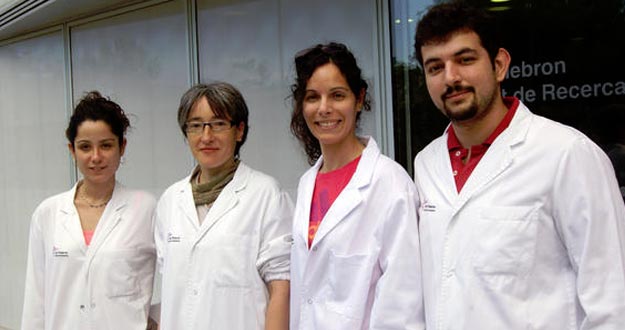Several Spanish scientists identify four target proteins, involved in breast cancer. You have to know that there are four genes that produce the target protein in breast cancer processes.
These researchers have used genetic material chains to eradicate malignant tumors. Now, they will be able to study new therapeutic pathways on identified proteins.
A team from the Hospital Vall d'Hebron has identified a microRNA, leading to the discovery of new genes and metabolic pathways involved in the development of tumors related to breast cancer, miR-125b. The results have been published in the open access repository PLOS ONE and it opens the door to study new therapeutic avenues.(Click on PLOS ONE).
The finding, made by the group of Oncology and Molecular Pathology of the Research Institute in the University Hospital Vall d'Hebron (VHIR) allowed four target proteins detected in mammary tumors.
The team, whose study was funded by the BBVA Foundation and is led by researcher Matilde Lleonart, specifically has discovered the role of a microRNA or string of genetic material in the production process related tumors breast cancer, according SYNC gathers.

Andrea Feliciano, Matilde Lleonart, Mileidys Pérez and Antonio de las Heras, researchers of the Hospital Vall d´Hebron, Cataluña, North western Spain
MicroRNAs are capable of regulating the expression of hundreds of genes. Specifically, as of today it is known that more than half of all genes in our genome are regulated by microRNAs, so that their study is more than required and all hypotheses point to its key role in the process of tumorigenesis.
The research focuses preferably in the biological and functional characterization of microRNAs, whose expression is very different when comparing normal and tumor tissue from the same patients.
Only with the expression pattern of these small molecules microRNAs researchers can predict blindly without knowing the tissue of origin in the case of tumor tissue. MicroRNAs utility not only limited to the prognosis but also the diagnosis and therapy.
The work carried out at the Vall d'Hebron has the ultimate goal to characterize therapeutic microRNAs to eradicate malignancies. The group has come to identify up to 35 different microRNAs in breast cancer. It is chains of genetic material, as explained Lleonart "represent a molecular signature and therefore its expression, by itself, is representative of malignancy, since there are multiple genes acting on".
This line of research started some experimental works from human tumors, being the miR-125b the more differentiated,when compared the tumor tissue with normal, in breast tissue. Subsequently comparing the effect of miR-125b in different cell lines of breast cancer with varying degrees of tumorigenicity.
Thus, they detected four genes, -CK2-α, ENPEP, CCNK and MEGF9-, on which miR-125b is capable of acting and produce target proteins in breast cancer processes. Are genes ranging from previously unknown membrane receptor protein kinases universal. What miR-125b makes is to inhibit protein resulting from the expression of these genes.
To date, there are over a hundred therapeutic targets that are being investigated in preclinical and clinical trials, but only demonstrated the effectiveness of two targets in breast cancer: drugs that inhibit HER2 receptor overexpression and hormone receptors.
With the results of this study, Lleonart concludes that "the four newly identified target proteins in vitro cell lines were found to have an important role in mammary tumors in vivo, which opens the door to the study of new therapeutic avenues for the identified proteins , most of them unknown until now”.
One of the proteins will help determine the aggressiveness of tumors. Specifically, one of these proteins, the CK2-α, has been identified as a prognostic factor in breast cancer, the expression of which can assist clinicians in determining the aggressiveness of mammary tumors.
So good and very interesting!, is not it?.
Till soon, kind regards,
Luis.
Sponsored by Costaluz Lawyers.
Please click down here:
